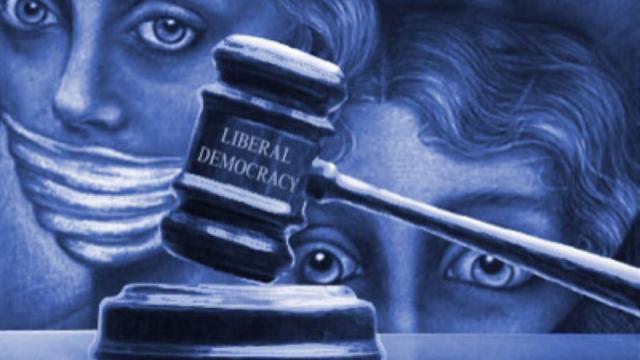
Yascha Mounk is used to being the most pessimistic person in the room. Mr. Mounk, a lecturer in government at Harvard, has spent the past few years challenging one of the bedrock assumptions of Western politics: that once a country becomes a liberal democracy, it will stay that way.
His research suggests something quite different: that liberal democracies around the world may be at serious risk of decline.
Mr. Mounk’s interest in the topic began rather unusually. In 2014, he published a book, Stranger in My Own Country. It started as a memoir of his experiences growing up as a Jew in Germany, but became a broader investigation of how contemporary European nations were struggling to construct new, multicultural national identities.
He concluded that the effort was not going very well. A populist backlash was rising. But was that just a new kind of politics, or a symptom of something deeper?
To answer that question, Mr. Mounk teamed up with Roberto Stefan Foa, a political scientist at the University of Melbourne in Australia. They have since gathered and crunched data on the strength of liberal democracies.
Their conclusion, to be published in the January issue of the Journal of Democracy, is that democracies are not as secure as people may think. Right now, Mr. Mounk said in an interview, “the warning signs are flashing red.”
Early Signs of Decline
Political scientists have a theory called “democratic consolidation,” which holds that once countries develop democratic institutions, a robust civil society and a certain level of wealth, their democracy is secure.
For decades, global events seemed to support that idea. Data from Freedom House, a watchdog organization that measures democracy and freedom around the world, shows that the number of countries classified as “free” rose steadily from the mid-1970s to the early 2000s. Many Latin American countries transitioned from military rule to democracy; after the end of the Cold War, much of Eastern Europe followed suit. And longstanding liberal democracies in North America, Western Europe and Australia seemed more secure than ever.
But since 2005, Freedom House’s index has shown a decline in global freedom each year. Is that a statistical anomaly, a result of a few random events in a relatively short period of time? Or does it indicate a meaningful pattern?
Mr. Mounk and Mr. Foa developed a three-factor formula to answer that question. Mr. Mounk thinks of it as an early-warning system, and it works something like a medical test: a way to detect that a democracy is ill before it develops full-blown symptoms.
The first factor was public support: How important do citizens think it is for their country to remain democratic? The second was public openness to nondemocratic forms of government, such as military rule. And the third factor was whether “antisystem parties and movements” — political parties and other major players whose core message is that the current system is illegitimate — were gaining support.
If support for democracy was falling while the other two measures were rising, the researchers marked that country “deconsolidating.” And they found that deconsolidation was the political equivalent of a low-grade fever that arrives the day before a full-blown case of the flu.
Venezuela, for instance, enjoyed the highest possible scores on Freedom House’s measures of political rights and democracy in the 1980s. But those democratic practices were not deeply rooted. During that apparent period of stability, Venezuela already scored as deconsolidating on the Mounk-Foa test.
Since then, Venezuelan democracy has declined significantly. In 1992, a faction of the Venezuelan military loyal to Hugo Chávez attempted a coup against the democratically elected government. Mr. Chávez was elected president in 1998 on a wave of populist support, and he immediately passed a new constitution that consolidated his power. His government cracked down on dissent, imprisoned political opponents and shredded the country’s economy with a series of ill-planned economic overhauls.
Likewise, when Poland joined the European Union in 2004, it was hailed as an especially strong example of a post-Communist country making the transition to consolidated democracy. But Mr. Mounk and Mr. Foa found strong signs of deconsolidation during that period: As early as 2005, nearly 16 percent of Poles said they believed democracy was a “bad” or “fairly bad” way of running the country. By 2012, 22 percent of respondents said that they supported army rule. And in the mid-2000s, a series of antisystem parties began to gain traction in Polish politics, including Law and Justice, Self-Defense of the Republic of Poland, and the League of Polish Families.
Today, that fever is starting to look a lot like the flu. Law and Justice, which won the presidency and a parliamentary majority in 2015, has systematically weakened democratic institutions.
The government’s attempts to undermine the country’s constitutional tribunal, for instance, set off an investigation by the European Union. The resulting report warned that the government’s actions “endanger not only the rule of law, but also the functioning of the democratic system.”
Warning Bells?
According to the Mounk-Foa early-warning system, signs of democratic deconsolidation in the United States and many other liberal democracies are now similar to those in Venezuela before its crisis.
Across numerous countries, including Australia, Britain, the Netherlands, New Zealand, Sweden and the United States, the percentage of people who say it is “essential” to live in a democracy has plummeted, and it is especially low among younger generations.
Support for autocratic alternatives is rising, too. Drawing on data from the European and World Values Surveys, the researchers found that the share of Americans who say that army rule would be a “good” or “very good” thing had risen to 1 in 6 in 2014, compared with 1 in 16 in 1995.
That trend is particularly strong among young people. For instance, in a previously published paper, the researchers calculated that 43 percent of older Americans believed it was illegitimate for the military to take over if the government were incompetent or failing to do its job, but only 19 percent of millennials agreed. The same generational divide showed up in Europe, where 53 percent of older people thought a military takeover would be illegitimate, while only 36 percent of millennials agreed.
In the United States, Donald J. Trump won the presidential election by running as an antisystem outsider. And support for antisystem populist parties in Europe, such as the National Front in France, Syriza in Greece and the Five-Star Movement in Italy, is rising.
Of course, this is just one paper. And the researchers’ approach, like all data-driven social science, has limitations. It is only as good as the survey data that underlies it, for instance, and it does not take into account other factors that could be important to overall stability, such as economic growth. At least one prominent political scientist argues that Mr. Mounk’s and Mr. Foa’s data is not as worrying as they believe it to be.
Also, of course, correlation is not the same as causation. Although the researchers found a relationship between deconsolidation and democratic instability, that is not the same thing as proving the root causes of either factor.
“That’s only one measure,” Mr. Mounk acknowledged of his own research. “But,” he added after a pause, “it should have us worried.”
He fears that the minutiae of politics can easily distract from these more fundamental dangers. “It’s not just about what Trump will do to the E.P.A.,” he said, referring to the Environmental Protection Agency. “It really is that Trump may try to undermine liberal democracy in the United States.”
“Look, this stuff is already going on in other places,” Mr. Mounk added. “If there’s one task that we have as journalists, as academics, as thinkers, it’s to drive the stakes of this home for people.”
3 WAYS TO SHOW YOUR SUPPORT
- Log in to post comments

















